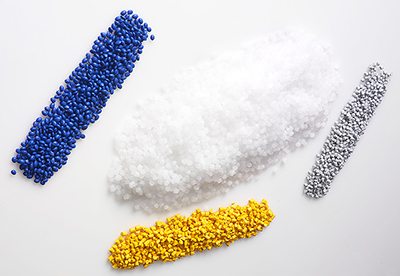

General Application Plastics
- PVC
- PE
- PP
- PS
Polyvinyl chloride (PVC)
PVC is hard as a raw material, and passivization agents are added to make it softer and more flexible.
The good mechanical, strength, thermal stability, flame retardation and insulation characteristics of PVC raw material provides significant advantages to PVC products.
PVC products can be hard or flexible, opal or transparent, insulating or conductive and colored. Unlike many other thermoplastics, most of the PVC applications has a life between 10 to 100 years.
The fact that it is resistant to many chemicals including mainly strong acids has made it a preferred material in such applications. It operates between +60°C and -15°C.
Characteristics:
- Easy machinability
- Water-proof
- Recyclability
- Cost advantage
- Lightness
- Long life
- Easy repair
- Flexibility
- Transparency
Polyethylene (PE)
Polyethylene is a white, semipermeable and quite durable polymer. The available polymers in the market can be classified as low density polyethylene (LDPE), linear low density polyethylene (LLDPE) and high density polyethylene (HDPE). Hardness and strength increases while softness temperature rises as the density increases. The most prominent characteristic of PE is its resistance to chemicals.
Characteristics:
- High chemical resistance
- High rate of crystallinity
- Lightness and ease of use
- Flexibility
- Durableness
- Robustness
- Flame retardation
- Fatigue and wear resistance
- Easy machinability
- Wide color range
- Low water absorption
Polypropylene (PP)
With its continuously increasing quality, Polypropylene (PP) can be used for many applications. Cost of this material is low which has a high fatigue resistance. Its impact strength is also high.
It can be used in many industries such as automotive, textile, food and infrastructure.
Characteristics:
- Cost advantage
- Robustness
- Easy melting
- High resistance to solvents and chemical oils
- Resistance to heat and moisture
Polystyrene (PS)
Polystyrene is a polymer manufactured by polymerization of the styrene in monomer form. It is obtained from petrol. PS abbreviation is more commonly used in plastic industry. Polystyrene is a solid thermoplastics under room temperature. It is processed by means of injection or extrusion and becomes molten under high temperatures. It is harder and excellently transparent as compared to other raw materials.
Properties:
- Transparency and brightness
- Ability to form easily
- High rigidity
- Low draw ratio
- Suitable for food

